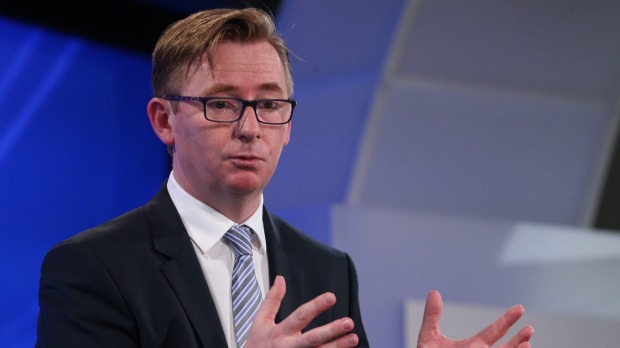
AMA President Brian Owler claims Medibank’s demands show the market-leading insurer does not understand medicine, nor the motivations of health professionals. Photo: Andrew Meares
The head of the doctors lobby, Brian Owler, says Medibank Private’s hardball negotiating demands are offensive and misunderstand the motivations of health professionals.
Referring to the market-leading insurer’s contract negotiation stoush with Catholic provider Calvary Health Care, the Australian Medical Association president said one of the 165 “highly preventable adverse events” that Medibank has said it will not pay for is maternal death associated with childbirth.
If someone thinks that a financial incentive will motivate doctors, nurses or anyone else … then they have no understanding of medicine or the people in it.
Brian Owler
“Unfortunately, maternal death can and still does occur in a very small number of cases – as tragic as that is,” he told the National Press Club in Canberra on Wednesday.

Medibank said it had been ”co-operative” during the session and both parties were ”earnestly seeking to resolve their differences”. Photo: Bloomberg
“Personally, however, I find it offensive that a private insurer would refuse to cover the costs of that patient and hospital in such a tragic event.
“If someone thinks that a financial incentive will motivate doctors, nurses or anyone else in a hospital to prevent maternal death any more than they desire to do so now, then they have no understanding of medicine or the people in it.”
Medibank and Calvary’s contract that sets out what the insurer is charged for care of its members will expire on August 31. If they cannot agree on a new deal, Medibank members who are cared for in Calvary’s 11 hospitals will have to cover a gap fee.

Calvary is the private hospital industry’s seventh-largest operator, with 1138 beds representing 4 per cent of the market. Photo: Nicolas Walker
Calvary has argued that not all on Medibank’s list are easily prevented, while also warning that its refusal to pay for certain patient readmissions within a month of surgery could jeopardise the care of patients.
Calvary chief executive Mark Doran said the initial mediation between the two parties on Tuesday was productive.
“There’s some hope that we can come to a reasonable approach to these issues that will involve the wider industry.”
In a statement, Medibank said it had been “co-operative” during the session and both parties were “earnestly seeking to resolve their differences”.
Responding to Dr Owler’s comments, the insurer said maternal childbirth was not included in its list of preventable complications, but was a ‘sentinel’ event and has been in previous contracts. “We understand it is a common industry practice not to pay for this event,” Medibank said, adding sometimes hospitals waive the charge.
Medibank said it was disappointed at Dr Owler’s comments and said it was “not afraid” to push for the elimination of preventable events in healthcare.
However, the AMA head may have hinted at a weakness that Calvary will be able to exploit in its negotiations. “As things stand, Medibank Private patients will no longer be fully covered for treatment in a Calvary Hospital,” Dr Owler said. “This is very concerning for patients in the ACT, Tasmania, and South Australia, in particular, where Calvary Hospitals are most prominent.”
Market power
Calvary is the private hospital industry’s seventh-largest operator, with 1138 beds representing 4 per cent of the market. Medibank has successfully signed up other small operators, such as St Vincent’s Health Care and Healthe Care, to its new quality and affordability regime.
However, new research from broker firm Evans and Partners suggests Calvary could have more market clout than its number of beds suggests. In a recent note to clients, analyst Matthew Prior explained that an operator’s market power is aligned to location, as opposed to total market.
On a measure of the population served in towns or cities where it is the only operator, Calvary is the second most powerful provider behind Ramsay, which has an overall market share of 26 per cent, Mr Prior said.
In Canberra, Calvary has 67 per cent share, while in the NSW regional town of Wagga Wagga and in Launceston, Tasmania, the group is the only operator.
Mr Prior said a in 2003 stoush between Healthscope, the country’s second-largest hospital operator, and Bupa, the second insurer, market power was the “crucial factor that broke the deadlock”.
“In that case, Bupa was forced to accept Healthscope’s terms in Darwin where they had 100 per cent market share but in Adelaide, despite having 40 per cent market share, Healthscope eventually capitulated to Bupa,” he said. “This was because patients preferred to use another hospital instead of switch insurers.”
Medibank, which accounts for about 29.1 per cent of the $19 billion private health industry, will push its criteria on Ramsay and Healthscope during contract negotiations in 2016.
The lobby group for insurers Private Healthcare Australia also put out a statement on Wednesday, three weeks after the stoush was first made public, saying the funds had a responsibility to its members to demand improved safety and quality of care. “Funds pay more when their members are subjected to poor care than they do for optimal care, but it is the member who suffers most in this scenario,” the group said.
An industry source said PHA sometimes struggles to find consensus among its members, and this may explain its late entry to the debate.
